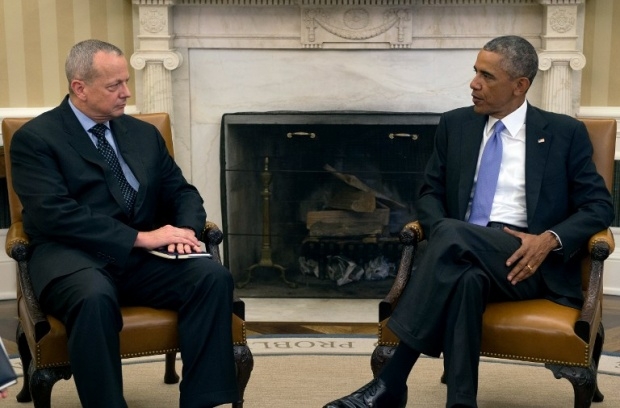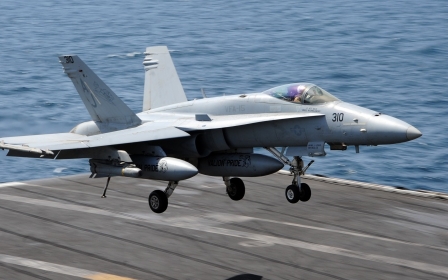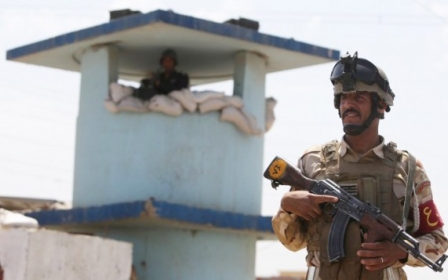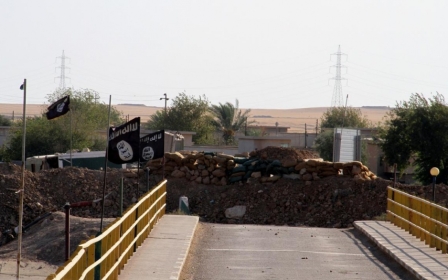US-led coalition 'victory' against IS not expected soon

Washington was set Thursday to approve plans to train and arm Syrian rebels in the fight against the Islamic State, as militants continued to gain ground in the north of the country.
Fears have grown over the wide reach of IS which has seized large parts of Iraq and Syria over the last several months.
The US Senate was expected to back a plan, approved by the House of Representatives on Wednesday, to train and equip moderate rebels in Syria, a key part of the anti-IS strategy.
It remains unclear however who exactly will benefit from the programme, as the rebels battling President Bashar al-Assad lack a clear command structure and range from secular nationalists to Al-Qaeda-backed extremists.
Obama met military commanders on Wednesday and, in a speech at MacDill Air Force Base in Florida, insisted the militants will be defeated.
"Our reach is long. If you threaten America, you will find no safe haven. We will find you eventually," Obama said, also standing firm on his pledge that a US ground combat mission is not on the cards.
Military containment not defeat
While the US is poised for a defeat of IS in Iraq and Syria through a long-term campaign coordinated with a number of regional powers, experts are less confident that this operation will be as straightforward as the US and its partners would hope for.
“While the US president has talked about destroying IS, a more realistic objective after looking at the situation on the ground would be containment and degradation,” said Nigel Inkster, director of transnational threats and political risk at the International Institute for Strategic Studies (IISS).
Operations against IS will be met with some resistance as experts say IS has the capacity to strike back.
“IS forces are made up of Sunni members of the Iraqi armed forces and intelligence as well as former Baathists who are trained and quite capable. They now have access to significant quantities of high grade weaponry,” said Inkster.
Reinoud Leenders, reader in International Relations and Middle East Studies at King's College London, War Studies Department agrees: “IS is capable of being elusive and can circumvent and go around the military actions and strike against them as they are currently doing.”
The US estimates that IS has 20,000 to 31,000 fighters, including many foreigners. The groups generates cash from extortion, kidnapping and smuggling of both oil and antiquities in Syria and Iraq.
Nevertheless experts say that militarily, the US is capable of significantly overcoming IS and its positions in Iraq and Syria as the group’s capacity although relatively noteworthy - in terms of is finance, access to oil and ability to smuggle and gain revenues for funding its military operations – is in no way a match for the US and its military capabilities.
“In strictly military terms, the objective [of defeating IS] is entirely achievable,” said Inkster.
Multi-faceted approach necessary
However experts believe that a strategy to prevent IS from further progress and potentially roll back some of its gains, must incorporate a more comprehensive and multi-faceted plan.
A three-pronged strategy is needed – the military one, counter insurgency and choking off finances, said Michael Stephens, Deputy Director of the Royal United Services Institute (RUSI) Qatar referring to making sure borders are sealed and targeting back dealers of oil and resources.
The broad outlines of the US-led campaign are founded upon the empowerment of local forces with various forms of support including airstrikes and extending intelligence.
As explained by Ben Barry, senior fellow for land warfare at IISS, on 10 September Obama set out a four pillar strategy: a systematic campaign of airstrikes, increased support to forces on the ground, drawing of counter-terrorism capabilities to prevent IS attacks and providing humanitarian assistance to civilians who have been displaced.
Stephens also believes an educational strategy is vital: “IS has for the last 15 months been in control of civilian areas of Syria, inculcating children and radicalising them. There seems to be no educational strategy for dealing with this.”
“Development strategies must be in place or this problem will return every 5-10 years,” he told MEE.
At the same time, a military approach must be coupled with and placed within a political framework designed to address the concerns of Sunni locals in Iraq and Syria, said Inkster.
“A military strategy will only be achievable in the context of better politics. It will be key to offer Sunnis in both Iraq and Syria some prospect of a better deal than what they think they are getting,” he explained.
“IS has made progress because it has been able to exploit the disenchantment and dissatisfaction of Sunnis who saw IS as a better alternative to Maliki’s exclusionary government and Assad’s oppressive one,” Inkster added.
Several analysts have long foreseen IS’s expansion as fuelled by the political conditions in Syria and Iraq, specifically those related to ethnic and sectarian divides.
US administration has not defined the meaning of a victory against, leaving analysts to wrangle with the question: When will we know the coalition has ‘won’?
Leenders sees that the envelopment of Sunnis referred to by Inkster is a substantial pointer toward such a success.
“A good indication of a relative victory will be the support of Sunni communities in the areas under IS control and their support for the coalition,” Leenders told MEE.
This cannot be won militarily; building a constituency or crowd in Syria and Iraq that would create a noticeable shift in Sunni support can be declared as a victory, he explained.
Even more challenging however is envisioning what the region would look like post-conflict, if a ‘victory’ is achieved.
Observers have said that while they can only make speculations, the Syria and Iraq we know today are unlikely to continue to exist. Instead a localisation of governance and identification as the power of Damascus and Baghdad have been fundamentally weakened, they say.
“In Syria, the regime will hold on to certain areas, the Kurds will go autonomous in their areas, while the areas governed by IS and Jabhat al-Nusra will be left in a vacuum of governance,” said Stephens.
Sevens envisages several scenarios that may take form in those areas formerly under IS control.
The Syrian opposition may take control or local polls may take place allowing for the election of a local governing council who can then decide if they want to join up with Damascus or break away into an autonomous region, he said.
Inkster agrees: “The idea of a unitary Syrian state operating on the basis that it did under the Baathists is probably gone. [Regarding Iraq], it is an open question of whether Iraq can survive in its current form anyway.”
Before a victory can be announced and the complications of a post-conflict region addressed, a long and potentially problematic process must be completed.
Syria the bigger challenge
While Iraq presents many challenges, Syria is a much more confounding arena experts believe.
“Any US military activity taking place in Iraq is with the consent of the Iraqi government while in Syria it is not going to taking place with the active consent of Assad. Some of Assad’s key international supporters - notably Russia - will be very vociferous in protesting any US military involvement in Syria,” said Inkster.
Obama last week ordered expanded air strikes against IS in Iraq and said the US was prepared to launch air raids on the militants in neighbouring Syria.
The US has carried out 174 air strikes in Iraq since early August, but the mission has since expanded to areas near Baghdad for the first time.
While the combination of local forces and US air power seems to be having some success, they have also apparently forced top IS leaders to cross the border back into Syria, the organisation's main base.
“The Syria component is the trickiest one, because any successes that may be achieved in Iraq, IS may compensate for it by retreating to Syria,” said Leenders.
“Although the US is hinting at launching airstrikes in Syria, there is no way of creating a significant blow without a continuous and large scale campaign like the one in Iraq. This process will take years and certainly not by just carrying out airstrikes,” he added.
Regional reluctance
Ten Arab countries – Egypt, Iraq, Jordan, Lebanon and the six Gulf states– as well as Turkey have so far been involved in talks with Kerry regarding the coalition and are potential members of the alliance.
While the US has been vocal in its dependence on regional powers to see this campaign through, another budding problem is the lack of solidity among the alliance’s regional powers.
Gulf monarchies have been accused of backing Sunni extremist groups in Syria and Iraq, and while Iran’s support for the coalition is vital, Iran is a key Assad backer and powerful player in Iraq's internal politics. At the same time, Turkey – which gives the coalition regional and Sunni legitimacy - has been reluctant about its support with 47 of its diplomats still hostage to IS militants in Mosul.
“The fact that for example Saudi Arabia did not condemn IS for 18 months shows that the countries are joining reluctantly which means their policies will also be so,” said Stephens.
Domestic politics have been playing into the extent of support regional members of the coalition are willing to give the anti-IS campaign. Experts believe that individual interests are likely to create unbalances within the coalition which may result in a half-half strategy.
“Everybody is looking to benefit their own domestic situation and their own regional position from joining the coalition,” Stephens told MEE.
“The Emiratis want to expand the idea of fighting terrorism to the Muslim Brotherhood and in Libya because that’s what bothers them. The Israelis would want to expand it to the Palestinians,” he said.
According to Abdel Bari Atwan, editor-in-chief of Arab news website Rai al-Youm, “the US will expand its air campaign using piloted planes as well as unmanned drones” over a period of up to three years.
Experts including Stephens however believe that a comprehensive strategy to at least contain this threat may roll over the next 10 years.
Leenders is unoptimistic about the coalition even holding up for that long and said: “If this will be a long-term campaign, you may expect the coalition will soon fall apart.”
Some 40 countries are backing the coalition to defeat IS.
New MEE newsletter: Jerusalem Dispatch
Sign up to get the latest insights and analysis on Israel-Palestine, alongside Turkey Unpacked and other MEE newsletters
Middle East Eye delivers independent and unrivalled coverage and analysis of the Middle East, North Africa and beyond. To learn more about republishing this content and the associated fees, please fill out this form. More about MEE can be found here.




